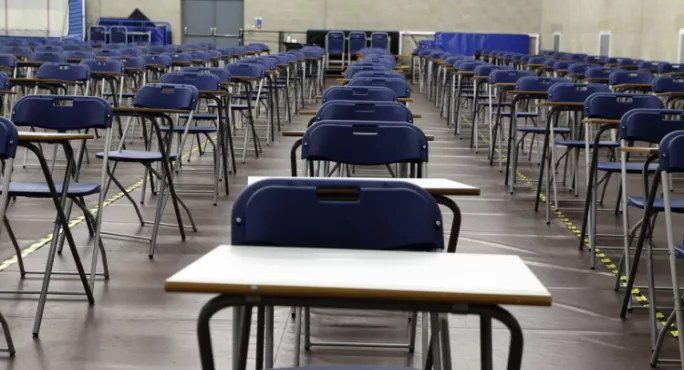- Home
- Five out of six A-level grade predictions by teachers are wrong, study shows
Five out of six A-level grade predictions by teachers are wrong, study shows

The vast majority of A-level grades predicted by teachers are incorrect, and accuracy levels are likely to worsen in future, according to research published today.
The findings are included in a report written by a UCL Institute of Education academic, which reveals that only one in six A-level grade predictions were accurate. Three-quarters of actual grades turned out to be lower than teachers had estimated, while just one in 10 were higher.
The report has sparked renewed calls for a complete overhaul of the UK’s university applications system, so that students apply after their final exam results are known.
Author Dr Gill Wyness suggested that teachers tended to over-predict, rather than under-predict, grades - particularly for lower-attaining pupils - because they treated predicted grades as a “target for students to aim for, rather than a prediction of how they will perform”.
Her report added: “Moreover, there would seem to be little incentive for teachers to under-predict a student’s grade since this may encourage them to ‘give up’ or at least discourage them from aiming ‘high’.”
AS levels, upon which predictions are often based, are a poor predictor of subsequent A-level attainment, but the “decoupling” of AS levels from A levels could make it even harder for teachers to make predictions, the report says.
‘Potential for even more errors’
It adds: “This may result in some teachers/schools using GCSE outcomes as predictors of A-level results, potentially introducing even more error into predictions.”
The research shows that overall predicted grades of university applicants from independent schools were more accurate than those from state schools.
However, when students with similar results were compared, comprehensive school students were less likely to be over-predicted than their independent and grammar school counterparts.
Accuracy of predictions varied dramatically according to the A-level attainment of the student, and students from the most disadvantaged backgrounds were more likely to have overly-optimistic grade predictions than more advantaged pupils.
But disadvantaged pupils who achieved AAB were slightly more likely to be “under-predicted” than more advantaged pupils who secured similar grades, even after controlling for factors such as school type, gender and ethnicity.
The report said: “Although this is a small effect (of only 1 percentage point), it is nevertheless a worrying finding - it implies that some of our most high-achieving students may be misinformed about their likely potential.”
The findings show that 2,700 high-ability disadvantaged students had exceeded their predicted grades over the past three years.
High-ability students with under-predicted grades were less likely to apply to top universities, the research also shows.
The report warns: “If being under-predicted results in students applying to universities which they are over-qualified for, this could have a direct impact on social mobility, potentially skewing social representation across higher education institutions.
“Moreover, it could result in students becoming demotivated and dropping out of university altogether.”
Pupils who achieved the equivalent of three Cs or less at A level were more likely to apply to a top university if their grades were over-predicted, the research shows.
The report notes that “some could argue this is a positive outcome, and that more holistic widening admissions policies have resulted in good progress in widening participation in recent years”.
But “a potential downside” was that it “could result in students attending universities they are not qualified for, resulting in them struggling to complete their degrees or dropping out”, it says.
The findings are based on the A-level results of 1.3 million young people over three years.
The report, Predicted Grades: accuracy and impact, concludes: “It seems highly inefficient to continue with a system in which life-changing decisions are made, and scarce university places are allocated, on the basis of inaccurate information.”
Sally Hunt, general secretary of the University and College Union (UCU), which commissioned the report, said it showed that most predicted grades were “guesstimates”.
“The results strongly support our call for a complete overhaul of the system, where students apply after they receive their results,” she said.
Ms Hunt added that the findings were no reflection on “the hard-working teachers tasked with the impossible job of trying to make predictions”.
The report follows an analysis in August by Ucas, which found that more than half of English 18-year-olds applying to university missed their A-level predictions by two or more grades last year.
Ucas chief executive Mary Curnock Cook suggested at a conference in February that teachers were deliberately bumping up pupils’ predicted grades.
This was partly because universities now faced fewer restrictions over the number of applicants they could accept, which was driving competition to recruit students, she said.
A Department for Education spokesperson said: “It is up to universities, as independent bodies, to decide on their admissions processes.
”However we’d expect them to take account of the full range of information available, not just predicted grades, so that they select the students with the talent and potential to succeed on their particular course.”
Want to keep up with the latest education news and opinion? Follow TES on Twitter and like TES on Facebook
Keep reading for just £1 per month
You've reached your limit of free articles this month. Subscribe for £1 per month for three months and get:
- Unlimited access to all Tes magazine content
- Exclusive subscriber-only stories
- Award-winning email newsletters



